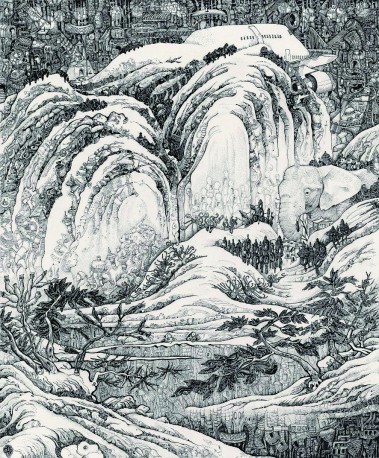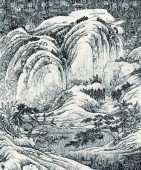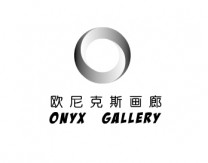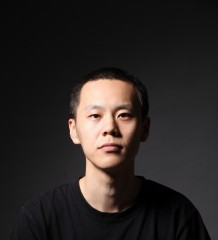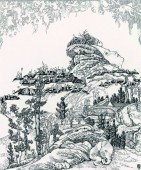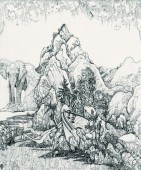醒来2
(平台服务时间:周一到周五 9:00-17:00)
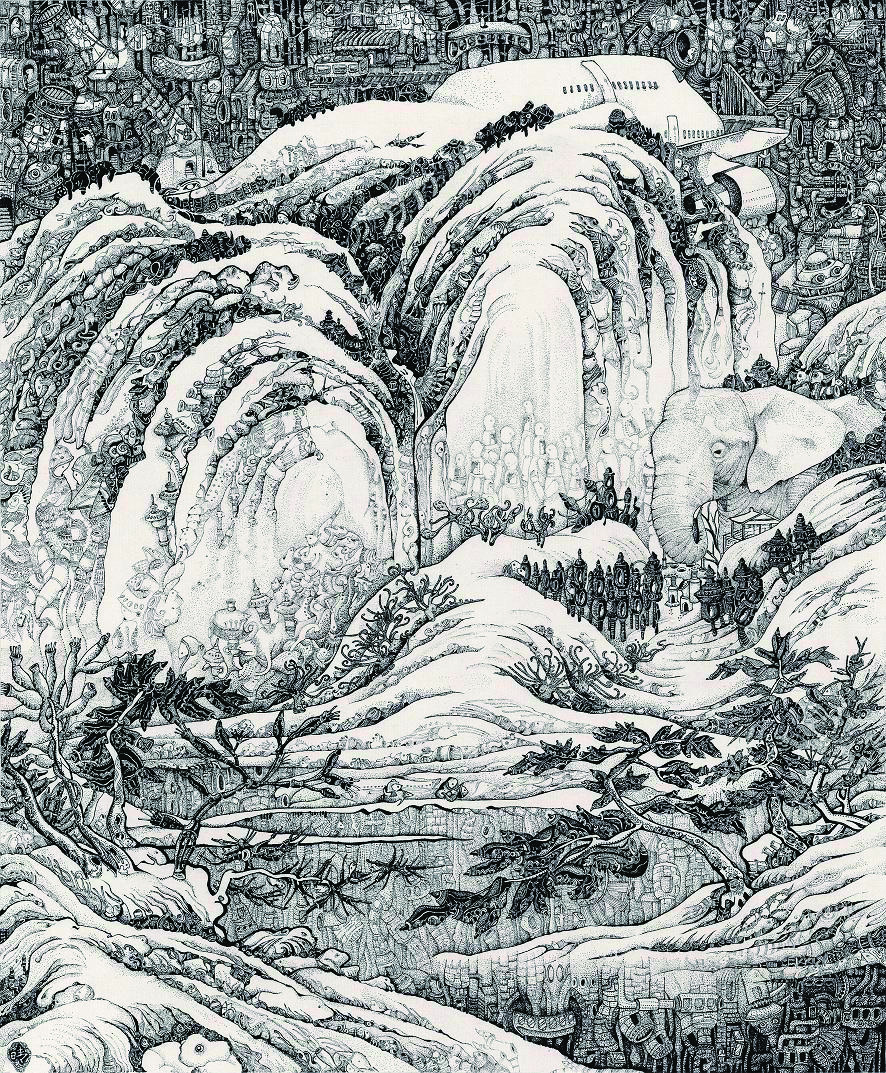
| 尺寸 | 30x36(cm) | 创作年代 | 2012年 | ||
|---|---|---|---|---|---|
| 作品分类 | 版画 | 材质 | 其它 | 题材 | 其它 |
| 作品标签 | |||||
| 适用空间 | |||||
作者介绍
1977年生于北京
2000年毕业于上海交通大学电子工程系
主要展览
2014 “时间的细脚” 双人展 欧尼克斯画廊 北京
2014 “分开的笔墨” 璞素艺术空间 上海
2014 “半边” 艺术家群展 半艺术空间 上海
2013 “痕迹”艺术家群展 雍和艺术空间 北京
2013 绘”生”绘色 三禾空间 北京
2013 “艺术@生活”画展 彩虹桥艺术文化中心 北京
2013 “线体主义艺术展” 桃江路8号 上海
2012 “稀捍行动”公益多媒体影像展 多伦现代美术馆 上海
2012 “再出线”线体主义四人联展 798正印坊 北京
2012 “游方”悦方ID开幕艺术家特别邀请展 长沙
2011 “出线”线体主义三人联展 大溪艺术空间 上海
2011 “非此即此”首届通像艺术群展 朴道草堂 北京
艺术家自述
我的作品试图用繁复的细节代替中国山水画的“皴法”,以便把抽象的“笔墨情趣”具体化:它能由远及近的把你带入不同的风景:在远处,那是一幅错落有致的水墨画图;随着你慢慢靠近,它浮现出巨大的机械,拥挤的城市和村庄;当你仔细贴近观察,才发现其中生活着很多奇怪的小生物,依附在宏大(对它们来讲)的笔触上延续着自己的故事。这些微小元素循着“笔墨”变化,它们不是拼贴,不能被单独的拆解;也不是简单的纹饰,不具有单一的模式。这是另一种可游可居的中国山水,它具有当前这个时代的特征:你很难掌握它全部冗繁的信息。
与追求效率的生产方式不同,我的创作需要长时间的描绘和冥想,以及对局部和整体之间的小心平衡。这种密集的劳动和介入让他的作品呈现出另一个极端的禅意:大繁而致简,至稠而意疏,像一片沾着露珠的花瓣,映现出亦幻亦真的大千世界。
Qing Li
Born 1977, Beijing
2000, Graduated from the Electronic Engineering Faculty of Shanghai JiaoTong University
Main Exhibitions
2014 “Fine Steps of Time” Onyx Gallery, Beijing
2014 “Strokes” PuSu Art Space, Shanghai
2014 “Half”, 1/2 Art Space, Shanghai
2013 “Signs”,YongHe Art Space, Beijing
2013 “Echoes & Reflections”,The Three Gallery, Beijing
2013 Art@Life, The Rainbow Art and Culture Center, Beijing
2013 “Linism Art Exhibition” No. 8, Taojiang Lu, Shanghai
2012 “Xihan Action” Multi-media images exhibiton, Shanghai Duolun Museum Of Modern Art
2011 “Lines Again”, the “Linism” Exhibition, 798, Beijing
2012 “You Fang”, Yue Fang ID opening artists special invitation exhibition, Changsha
2011 “Lines”, the “Linism” Trio Exhibition, Daxi Art Space, Shanghai
2011 “Neither this nor this”, the First Pan-Imagine Group Exhibition, Pudao Caotang, Beijing
Artist statement
To appreciate a Chinese landscape painting, one needs to not only "look" from a distance but also "read" from close up. While you will get a perception of the painting in its entirety from looking, it is the reading that allows you to dive deep into the texture strokes. These texture strokes, as the primary artistic language used in Chinese landscape painting, is of ultimate importance and value. "The sentiment of brush and ink", as traditionally put when people described these artworks, is about being able to feel and appreciate the running of the brush and the delicate control applied by the artist.
However, this once very real aesthetic process has gradually been abstracted by modernization, as most of us today no longer use a Chinese painting brush or rice paper.
All the small elements in my work grow out of and evolve along the running of brushstrokes. They are not "assembled" together and therefore cannot be deconstructed and comprehended as separate objects. Neither are they simply emblazonries that follow some monomorphic pattern. In brief, what I am trying to do with them is to guide people to "read". And that reading, hopefully, can be an interesting experience for many.

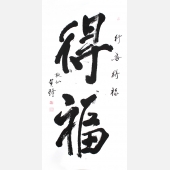 黄琦
黄琦 测试用艺术
测试用艺术